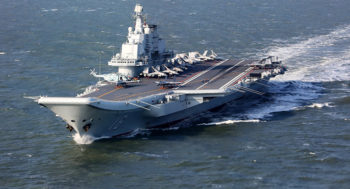
China’s Defense Ministry has said its naval vessels acted professionally and lawfully in an encounter with Australian naval vessels in the South China Sea.
The statement was made in response to reports that China had challenged Australian warships.
The Australian Defence Department confirmed three ships had recently travelled to Ho Chi Minh City in Vietnam but declined to comment on “operational details related to ships transiting the South China Sea”.
An official was cited by the Australian Broadcasting Corp as saying the exchanges with the Chinese navy were polite but “robust”.
China’s Defence Ministry said in a statement the reports in Australian media “did not accord with the facts”.
“The Chinese side’s ships used professional language to communicate with the Australian side, and their operations were lawful, in compliance, professional and safe. The encounter happened on Sunday,” it said.
China recently completed extensive military exercises in the South China Sea, where its claims are hotly disputed by Vietnam as well as the Philippines, Malaysia and Brunei. Taiwan also lays claim to most of the sea.
Earlier, Australia’s Defence Department said in a statement emailed to Reuters that its forces had “maintained a robust program of international engagement with countries in and around the South China Sea for decades”.
“As they have done for many decades, Australian vessels and aircraft will continue to exercise rights under international law to freedom of navigation and overflight, including in the South China Sea,” the Defence Department said.
Australian Prime Minister, Malcolm Turnbull, in London for a Commonwealth Heads of Government meeting, declined to confirm the interaction between the Australian warships and the Chinese military, Fairfax media reported.
Chinese Foreign Ministry spokeswoman Hua Chunying told a daily news briefing China’s consistent position was to support and actively safeguard the right of all countries to have freedom of navigation and overflight in the South China Sea, in accordance with international law.
“If Australia is referring to freedom of navigation in accordance with international laws, there is no problem whatsoever,” Hua said in Beijing.
“But if Australia has other motives, we hope it can see the trend in the South China Sea is stable and improving, and work together with China and other neighbouring countries for the peace and stability of the region.”
China’s construction of islands and military facilities in the South China Sea, through which some $3 trillion in trade passes annually, has sparked concern it is seeking to restrict free movement and extend its strategic reach.
The United States has conducted “freedom of navigation patrols” through the South China Sea, stoking tension with China which says it will protect its sovereignty.
Australia is a staunch U.S. ally.
Its navy ships Anzac, Toowoomba and Success are on a three-month deployment in Southeast Asia, which will involve exercises with a number of countries in the region, the Australian Defence Department said in a statement on April 17.
The Toowoomba sailed to Vietnam from Malaysia, while the other two Australian warships went through the South China Sea from Subic Bay in the Philippines.
Agency Report